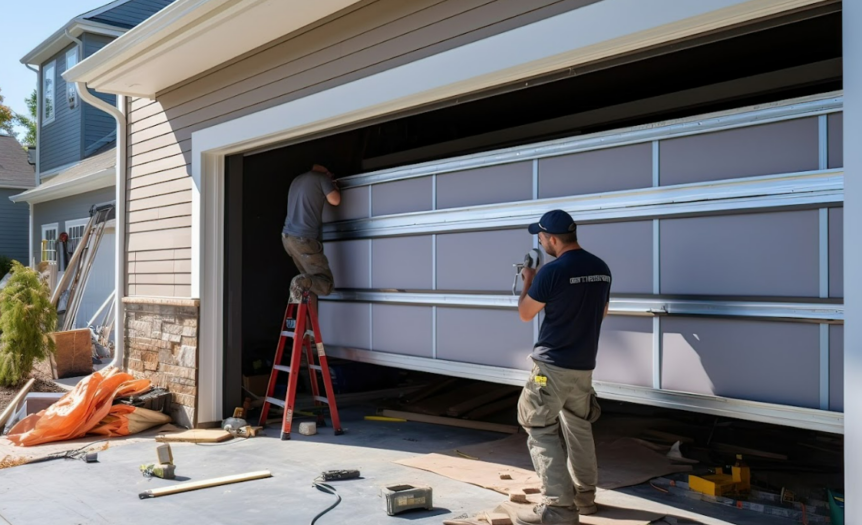Selecting a new garage door is no small decision. This slab of steel, aluminum, fiberglass, or wood will literally help shield your home from the elements and unwanted intruders. Not to mention, an aging, worn-out garage door can make an otherwise beautiful home look abandoned or dilapidated. So, when your existing door starts sticking, acting temperamental, or showing more dings and dents than your family minivan, it’s probably time to shop around.
But with so many options, price points, and features to evaluate with garage doors today, picking the right replacement model can get overwhelming in a hurry. To make the best choice from both a financial and functional standpoint, keep reading, as this blog post shall walk you through the most critical considerations. Arm yourself with this intel so you can shop smartly, avoid buyer’s remorse, and safeguard your home with a garage door that lasts.
Door Material
When exploring your door options, you’ll first want to decide which material best fits your vibe. The most common varieties include good old wooden doors, steel, aluminum, fiberglass, or even a custom garage door if you’re up for it.
For instance, timeless wooden doors still rock that coveted classic, natural look. But fair warning – they demand some tender loving care to keep them looking sharp. Meanwhile, steel offers maximum durability at a budget-friendly price.
Rust-resistant aluminum doors provide sleek, modern appeal, though at a premium cost. And fiberglass doors achieve the stained wood visual without the labor-intensive upkeep. On the other hand, if you wish to have full control of your garage door’s material, custom garage door panels let you get creative with shapes, inlays, and designer window patterns. So, weigh your home’s style, weather patterns, and cash flow before falling hard for any material.
Insulation Rating
A garage door’s ability to keep the heat in (or cold air out!) is measured by its R-value. Basically, the higher the R-value, the better it insulates. Most experts recommend aiming for R-8 to R-15 ratings.
Well-insulated garage doors can block sound nicely, help fend off termites from taking up residence, and regulate interior temps so your garage space feels comfortable year-round. Plus, solid insulation means you don’t fork over cash needlessly to cool or heat the great outdoors! Even a few degrees of change make a difference to your gas and electric expenditures.

If going green is important to your family, note that doors lacking proper insulation can impact your overall energy usage significantly. So be sure to inquire about heat transmission ratings as you get quotes.
Special Features
Today’s garage doors come with clever upgrades like built-in windows, decorative hardware, remote keypads, motion detectors, and Wi-Fi connectivity – all to make your life easier. But if you’re looking for added safety, look for pinch-free operation, tamper-resistant bottom brackets, and automatic reverse sensors to stop and reverse the door if objects are detected in its path. Ultimately, just shop around for the ones that best fit your household needs and can make your life more convenient.
Maintenance Needs
While high-quality garage doors are made to last for years with proper upkeep, no door is truly maintenance-free. That’s why manufacturers suggest reapplying protective sealants every year or two. This maintains the waterproof barrier, keeping moisture and insects at bay.
For steel doors, visually inspect a few times yearly for dings, damage, or early rust spots bubbling up. Address this right away with touch-up paint to avoid compounding issues. Lubricate the moving parts, tighten any loose screws or hardware, and test those automatic sensors with obstructing objects now and then. Consider an annual pro inspection just for peace of mind.
And for wood doors, refinish surfaces whenever you notice cracking, rotting, or anything funky happening with the protective staining or paint. Also, replace batteries on keypads, remotes, and other electronics about twice a year to avoid getting stuck unexpectedly.
Warranty Coverage
When investing in a replacement garage door, you’ll want backup assurance that if anything goes wrong prematurely, you’ve got recourse. Quality doors come with manufacturer warranties guaranteeing defects for extended periods. Make sure to ask sellers to explain coverages clearly so you know what’s protected.

For instance, some brands offer lifetime warranties on the steel door sections themselves. This safeguards against rust, cracking, splitting, or anything that compromises the door’s structural integrity and performance. Separate limited warranties usually apply to hardware, electronics, and moving components like springs, rollers, and tracks.
You’ll also want guarantees on proper installation workmanship. If a pro installer goofs something up that later causes problems, they remain on the hook for remedies.
Takeaway
Choosing a replacement garage door is a major purchase decision that brings lasting impacts. From a door’s material composition and insulation rating to special features and warranty coverage, numerous factors merit close consideration during the selection process. So, weigh your needs, climate, budget, and projected upkeep demands. With research and a realistic evaluation of construction quality and long-term costs, you’ll invest wisely in a garage door that reliably serves your home for many years.








